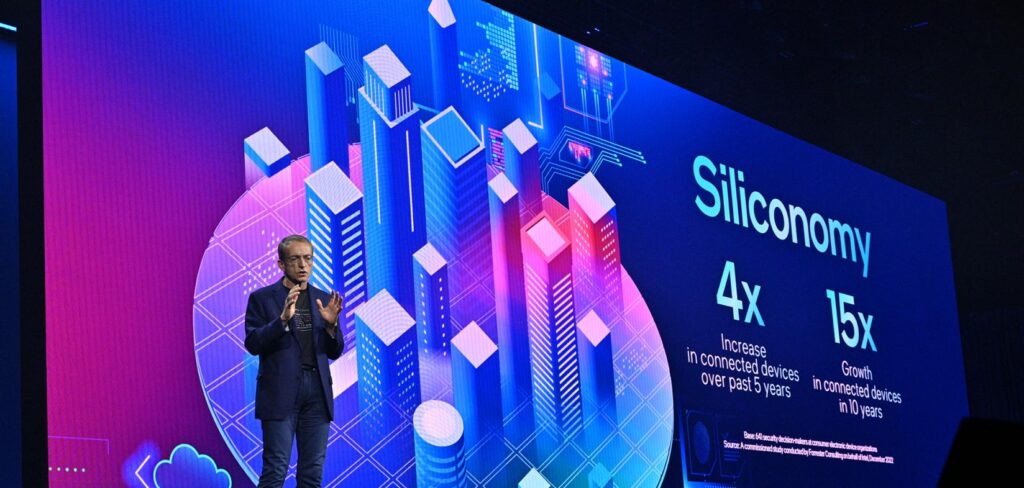US-based tech giant Intel has introduced “Siliconomy” as an emerging trend that positions artificial intelligence (AI) as the driving force behind daily life, particularly within the business landscape, in a bid to revolutionize the global technology landscape
“Fueled by AI and the convergence of ubiquitous computing, connectivity, infrastructure, and sensing, the Siliconomy represents a new era, demanding an exponential advancement in computing technology,” Intel CEO Patrick P. Gelsinger said at the third edition of its flagship event, “Intel Innovation 2023,” in San Francisco, California, which Business Monthly attended.
This gathering brought together leaders and developers from the tech industry to explore the emerging trends shaping the global tech landscape and their potential to transform it entirely moving forward.

Intel’s Siliconomy vision
Gelsinger underscored that the world is currently undergoing a new phase of global expansion, with computing at its core, offering greater opportunities and the promise of a brighter future.
Gelsinger underlined five key technological superpowers that are shaping the world and propelling the development of Siliconomy: Artificial Intelligence (AI), Computing, Infrastructure, Connectivity, and Sensing.
Silicon forms the foundation of everything digital, he said. Presently, the digital economy alone contributes to over 15% of the global gross domestic product (GDP). Over the past decade, it has been growing at a rate two and a half times faster than the physical world GDP, highlighted Gelsinger.
He further explained, “Everything can be considered a computer, and computing now defines our experience of the world. All individuals and objects are interconnected. We are forging a dynamic and dependable pathway for data storage and connected computing, combining limitless scalability with extensive reach, all while addressing the growing demand for reduced latency and enhanced bandwidth.”
Market size
The global artificial intelligence market size was valued at $136.55 billion in 2022 and is projected to expand at a compound annual growth rate (CAGR) of 37.3% from 2023 to 2030. The continuous research and innovation directed by tech giants are driving the adoption of advanced technologies in industry verticals, such as automotive, healthcare, retail, finance, and manufacturing.
Private-public partnerships
An economic system is now emerging through highly distributed edge-to-cloud computing platforms, where semiconductors play a pivotal role in essential technologies in an increasingly digital world.
According to Intel CEO Gelsinger, the emergence of low-cost, high-resolution sensors generating vast volumes of data from smart devices at the edge, when coupled with advancements in automation, processing, inference, and software, imbue machines with human-centric capabilities. Gelsinger asserted that our weaknesses are transformed into digitally enhanced strengths. These foundational technologies profoundly shape our perception of the world by acting as a bridge between the analog age and the digital age, he added.
“Despite the ongoing global economic challenges, Siliconomy makes it abundantly clear that these small chips are indispensable for maintaining and propelling our modern economies,” Gelsinger highlighted as he discussed how their new AI suite could potentially bolster economies in the midst of the ongoing economic downturn.
“For the past fifty years, the location of oil reserves has shaped geopolitics. In the next five decades, the location of technology supply chains and semiconductor manufacturing will assume even greater significance,” Gelsinger predicted.
In this context, Gelsinger said, “We must collaborate to meet the rising demand. This will require ongoing partnerships between the private and public sectors, along with new funding models that offer financial flexibility to sustain a thriving “Siliconomy.” This thriving ecosystem will be supported by a secure and sustainable supply of exceptionally engineered processing power, facilitated by globally balanced and resilient supply chains.”
“As we peer into the decades ahead, we can anticipate a continued shift towards digitization in every aspect of our lives – how we work, learn, connect, worship, care for, and evolve,” urged Gelsinger.
Democratizing design
The CEO also emphasized the importance of embracing the democratization of design, allowing for rapid innovation based on a diverse set of building blocks and standardized interfaces. This diversity within an open ecosystem contributes to resilience, particularly during challenging times, offering a balance amid disruption.
“As adoption grows, new ideas emerge, fueling further adoption and innovation. However, we must also ensure responsible technological advancement, a responsibility that extends to both development and application. For instance, AI is now capable of performing tasks that were once challenging for traditional computing,” he pointed out.
Gelsinger highlighted the imminent reality that machines will increasingly make decisions surpassing those of humans. Therefore, it becomes crucial to incorporate human oversight and alignment into the design.
Project Strata
During the event, Intel unveiled its plan to launch an edge-native software platform called “Project Strata” in 2024. This platform is expected to offer premium services and support, assisting developers in building, deploying, managing, connecting, and securing distributed edge-related infrastructure and applications.









